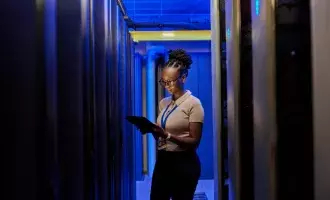The transportation sector stands at a critical juncture, facing a pressing need for digital innovation and a more diverse workforce.
As industries worldwide grapple with technological advancements, the transportation field is particularly challenged by a profound skills gap, exacerbated by long-standing stereotypes and an ageing, predominantly male-dominated workforce. Research from the Department of Education has found that the ratio of males to females stands at a stark 4.1, signalling a significant gender imbalance. Furthermore, over 35% of its workforce is aged over 50, underscoring the need for age diversity and more intergenerational collaboration. Such gaps not only hinder the transport sector’s capacity for innovation but also its strategic imperative to cultivate an inclusive and skilled workforce.
At the crossroads of innovation and inclusivity
With nearly 50,000 rail employees projected to retire by 2030, and competitive salaries and less stressful work environments in other sectors drawing potential candidates away, the urgency to address these issues is clear. The multifaceted nature of this challenge calls for a transformative approach that includes promoting STEM education, dismantling entrenched perceptions, and fostering an inclusive workplace culture.
Enhancing the sector’s appeal through STEM and visibility
STEM education emerges as a beacon of hope in this scenario, serving as a critical lever to attract and nurture the next generation of digital talent. By highlighting the transformative impact of careers in transportation - from decarbonising aviation to rolling out a nationwide electric vehicle charging infrastructure - the sector can challenge the ingrained perception that it’s a male-orientated profession and unveil the breadth of opportunities it offers. It’s about making these career paths visible and accessible and connecting aspiring professionals to a future where they can contribute to meaningful societal change.
Championing diversity for a resilient future
Supporting diversity and inclusion goes beyond addressing the skills gap; it’s about enriching the transport sector with a wide range of perspectives that foster innovation and resilience. Initiatives aimed at rethinking recruitment strategies are crucial. This includes scrutinising job advertisements for unconscious biases, engaging with diverse recruitment channels, and showcasing role models from underrepresented groups. Such efforts can demystify the sector and illustrate its commitment to reflecting the diversity of the communities it serves.
The impact of the skills shortage is palpable - cancelled trains and unreliable bus services are just the tip of the iceberg, underscoring the urgent need for a skilled, versatile and digitally-savvy workforce. Government and industry initiatives are pivotal in this transformation, with new apprenticeships and investments poised to inject new life into the sector. Furthermore, the anticipated Department for Transport’s AI strategy exemplifies the forward-thinking that’s needed to future-proof the workforce.
Integrating digital talent and diversity: The road ahead
The transportation sector’s journey towards integrating digital talent and diversity is complex yet imperative. Reflecting our organisation’s commitment to this cause, Owen Barry, Managing Director for Justice, Central Government and Transport at Capita, recently spoke at a government committee meeting and underscored the importance of segmenting users, tailoring services to meet diverse needs and leveraging post-pandemic digital skills and resources to enhance innovation and diversity. By dispelling myths, championing STEM, embracing diversity, and innovating in recruitment, the sector can bridge the current gap and pave the way for a more inclusive and innovative future. This transformation is about more than filling vacancies; it’s about redefining the essence of transportation for the 21st century – a sector that is dynamic, inclusive, and equipped to meet the challenges of tomorrow.
Recent initiatives such as the partnership between the Society of Operations Engineers (SOE), the Bus Centre of Excellence (BcoE), and the Confederation of Passenger Transport (CPT) highlight the pivotal efforts that are being made to bring more women into engineering roles, showcasing the industry’s commitment to dismantling barriers and fostering a diverse talent pool. Similarly, programmes such as Capita’s Novus Future Talent are proving to be critical in offering pre-vetted, skilled digital talent to the industry, emphasising diversity with a significant representation from BAME backgrounds. Together, these steps underline the sector’s dedication to building a future that is not only technologically advanced but also rich in diversity and inclusion.
Shape the future with us
Join us in shaping a digitally savvy, inclusive future in transportation. Contact us today to learn more about driving innovation and diversity forward in your organisation.

Phil Evans
Market Development Director, Transport
As a domain expert, Phil provides business development, sales and strategy expertise to the energy and transport sectors specialising in new technologies, innovation and digital transformation.







